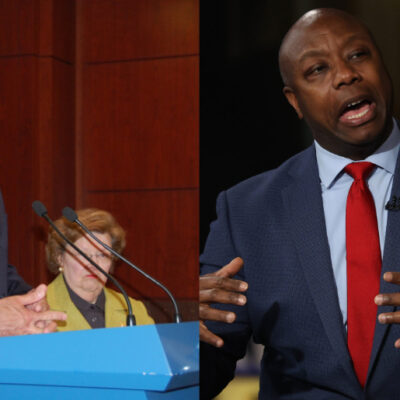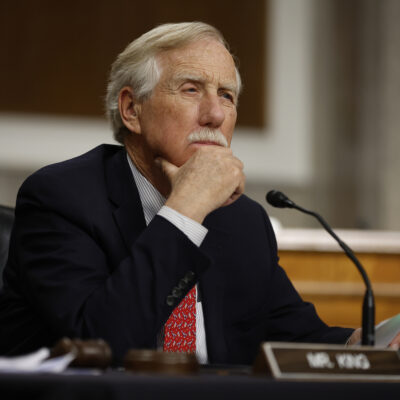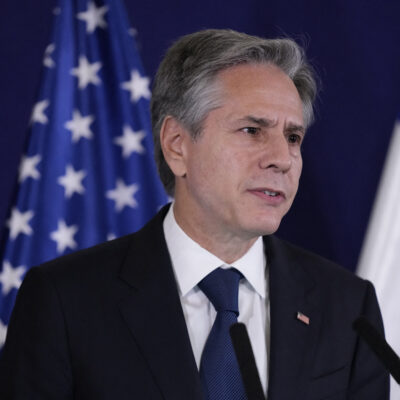JI readers share their thoughts on the future of U.S. civil discourse
'To confuse politics for absolute truth is how societies unravel'

Following President-elect Joe Biden’s victory, we asked JI readers about the future of U.S. politics and American civil discourse in the wake of a bruising election campaign.
Yossi Klein Halevi, senior fellow of the Shalom Hartman Institute: “What worries me is the contempt that has been coming out the last few days. Certainly there are those voices that are calling for reconciliation and generosity, but you also have many voices calling for a kind of political revenge. The person who summed up that mean-spirited approach was [Rep. Alexandria Ocasio-Cortez (D-NY)], who called for the creation of an enemies list of all those in positions of authority who supported [Donald] Trump. That rhetoric of, ‘We won’t forget, we won’t forgive’ is how society self destructs. I worry about an America that treats politics like theology. Politics is not or shouldn’t be religion. Politics is an approximation of truth. It’s not true itself. Politics is dealing with a flawed world on its own terms, of trying to make it a little better. But to confuse politics for absolute truth is how societies unravel.”
Former Rep. Steve Israel (D-NY): “Joe Biden took the first step by extending an olive branch and acknowledging that we have to lower the temperature and listen to one another again. I’ve called him the conciliator-in-chief. He has demonstrated an ability to bring people together and to bridge gaps. That makes me feel hopeful that we’re going to return to some form of respectful discourse. It won’t be easy because there is bias. There are some people who will reject compromise. But Biden has been saying that we’ve got to stop yelling at each other and begin talking with one another, and he’s got the skill set to address it meaningfully.”
Former U.S. Ambassador to Israel Martin Indyk: “I am optimistic at the fact that the Democrats will control the White House and the House, while the Republicans will control the Senate. Rather than being a recipe for further division, I’m hopeful that it will work as a recipe for coming together. Everybody has had enough of the complete craziness of the last four years and they’re anxious to try to find ways to come together. God knows there’s enough common ground when it comes to the pandemic and the economy… there’s potential for coming together.”
Former national director of the Anti-Defamation League Abe Foxman: “It can’t get worse. It will get better. How quickly, how soon, how [much will] people be willing to reach out to each other, even though they disagree? Time will tell. But certainly, I think, at the head of this country will be someone whose voice and whose neshamah (soul) is to embrace everybody. It starts from the top. So I hope it will quickly filter down to the nation.”
Former U.S. Ambassador Daniel Kurtzer: “Halevai (if only), as they say, but I am fearful that because we will have a split presidency and Congress that we’re going to run into the same partisanship, particularly on appointments and on some of the core issues that Biden does believe in, like health care, immigration reform and race relations. I think there will be constant tension between the administration and Senate that’s still run by Mitch McConnell on those issues. I hope I’m wrong, but I am not persuaded that I’ll be wrong.”
J Street President Jeremy Ben-Ami: “The Jewish people have thrived on debate over the centuries. The differences in views within our community — both in this country and globally — are real and meaningful. There are starkly different views on the best path forward for the U.S., Israel and the Jewish people. We’ll continue to argue and fight in the political arena here and in Israel. What I hope is that we can do it with a spirit of respect and with empathy and an understanding that while we may never agree with each other, we are stronger as a people when we work our differences out civilly, respect the rule of law and value the worth of every individual.”
Holocaust historian and author Deborah Lipstadt: “I think, at the very least, we will have a leader of the country who will unequivocally condemn antisemitism and extremism, and will unequivocally say this is not right. My fear is that after four years of being given dog whistles, wink-wink nod-nod, it’s not going to go away. I am very concerned. I’m a little bit more sanguine than I would have been otherwise, but we are facing very difficult days because we have four years of these groups feeling that they had a friend in the White House. And whether they had it or not, they had someone there who was not willing to really take them on. They feel they’ve gotten a green light and they’re going to run with it.”
Rabbi Avi Shafran: “The devolution in American society of civility, and the seeming loss of the ability to respectfully disagree with one another, have been tragic consequences of recent years. Blame can be placed on both sides of the political divide, but pointing fingers is pointless. I hope that a President Biden will indeed, as he pledged during the campaign, make the bringing of Americans together a major goal. And that doesn’t mean a dearth of dialectic. It simply means that disagreements will be able to be voiced without rancor or insult. Halevai.”
Nathan Diament, the Orthodox Union’s executive director for public policy: “I think anybody has to be worried. But I think the worry has to be translated into action and effort. We shouldn’t want to keep living in this hyper-polarized environment. But to focus on the Jewish community, in particular, we should be placing a lot of value on community, our appreciation for the fact that in the broader Jewish community there’s more that unites us than divides us. Even if we have disagreements about political issues, we need to make efforts to reduce polarization.”
Aaron David Miller, a senior fellow at the Carnegie Endowment for International Peace: “What did these elections show? Trump was rejected, but he was not repudiated. And I think that’s the real difference. It would not surprise me at all if Biden were a one-term president and the game is thrown wide open again in 2024 with people like Tom Cotton, Mike Pompeo, and especially if Trump remains on the scene. I don’t think we are anywhere near the kind of reset for civility in our politics. Our national nightmare might be ending, but it’s going to be a long, painful goodbye.”
Sheila Katz, CEO of the National Council of Jewish Women: “NCJW always seeks to advocate for the issues we believe in with respect and civility, and we believe the Biden/Harris administration will only help restore productive discourse in our nation.”










